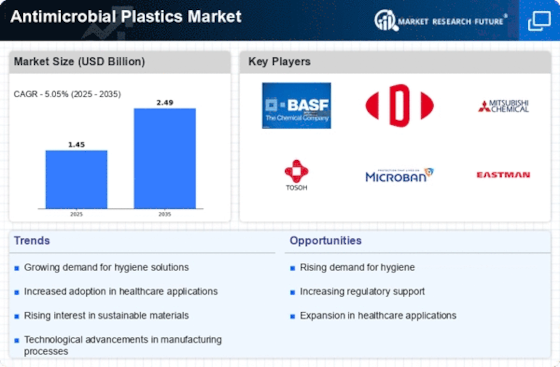Top Industry Leaders in the Antimicrobial Plastics Market

Antimicrobial Plastics Market
The global antimicrobial plastics market is a battleground where titans clash, their weapons not swords and shields, but innovative additives and strategic maneuvers. With a projected valuation of arena is teeming with opportunity, attracting players big and small vying for a slice of the pie. Let's delve into the strategies they employ, the factors dictating dominance, and the recent developments keeping this market abuzz.
Strategic Maneuvers for Microbe Mastery:
-
Product Diversification: Leading players like BASF and Lanxess aren't content with one-size-fits-all solutions. They're diversifying their offerings, catering to specific needs with silver-based additives, nanomaterials, and even plant-derived antimicrobials.
-
Application Focus: Understanding where the germs lurk is key. Milliken Chemical focuses on textiles for healthcare facilities, while Dow Chemical targets food packaging, each leveraging their expertise to secure market share.
-
Regional Prowess: Adapting to local needs is crucial. Ticona Engineering Polymers caters to the price-sensitive Indian market with affordable options, while Momentive Performance Materials focuses on high-performance solutions for the demanding European market.
-
Sustainability Drive: Green credentials matter. Companies like Biocote are developing eco-friendly additives made from recycled materials, attracting environmentally conscious consumers and complying with stringent regulations.
-
Vertical Integration: Gaining control over the supply chain is a power move. King Plastic Corporation expands its presence by acquiring mines for raw materials, ensuring quality and cost-effectiveness.
Factors Dictating Market Share:
-
Brand Reputation and Expertise: Established players like Bayer Material Science, with their proven track record and extensive technical knowledge, inspire trust and command premium prices. -
Product Portfolio Breadth: Offering a diverse range of additives with varying modes of action, like Parx Plastic does, caters to varied customer needs and applications. -
Technical Expertise and Customer Support: Deep knowledge of antimicrobials and their applications, like Teknor Apex Company's technical support and training programs, provide value beyond the product itself. -
Regulatory Compliance and Certifications: Adherence to safety and environmental regulations, like FDA approval for food contact materials, opens doors to new markets and builds trust. -
Sustainability Savvy: Eco-conscious customers favor bio-based and low-VOC additives. Players like Doeflex Vitapol, with their green initiatives, attract this growing segment.
Key Players
BASF SE (Germany) Clariant AG (Switzerland)
Lonza (Switzerland)
Polyone Corporation (US)
Microban International Ltd. (US)
PARX Plastics N.V (The Netherlands)
King Plastic Corporation (US)
BioCote Limited (UK)
Sanitized AG (Switzerland)
Americhem Inc (US)
Recent Developments:
-
September 2023: A major airline starts using antimicrobial seat covers made from recycled plastic, highlighting the potential for sustainable solutions in the transportation sector. -
October 2023: The American Society for Testing and Materials updates its standards for testing antimicrobial plastics, raising the bar for quality and efficacy. -
November 2023: Startups emerge offering innovative coatings and sprays that transform ordinary plastics into antimicrobial surfaces, disrupting the traditional market. -
December 2023: Concerns about the potential overuse of antimicrobials and their impact on human health and the environment spark public debate, prompting industry leaders to call for responsible development and research into non-chemical alternatives.










